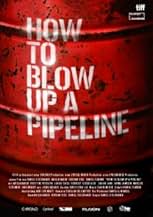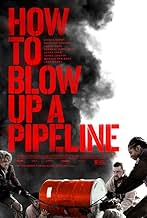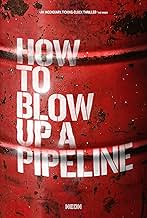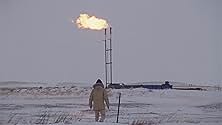ÉVALUATION IMDb
6,9/10
12 k
MA NOTE
Une équipe de militants écologistes met au point un plan audacieux pour perturber un oléoduc.Une équipe de militants écologistes met au point un plan audacieux pour perturber un oléoduc.Une équipe de militants écologistes met au point un plan audacieux pour perturber un oléoduc.
- Prix
- 5 victoires et 16 nominations au total
Avis en vedette
I did enjoy 'How to Blow Up a Pipeline', but I couldn't help but want to rewatch 'The East' (dir Batmanglij, 2013), which had a similar structure (re denouement), but the stakes seemed higher in 'The East', and the psychology of the characters were a lot more deep and varied. I think that was because you come at 'The East' from the point of view of an outsider, and you watch her character arc alongside that of the eco-terrorists, and see how interacting with them changes her (and changes you, as a viewer, too).
But, even so, I'm very glad I did watch 'How to Blow Up a Pipeline', and the film made me want to read the source material.
But, even so, I'm very glad I did watch 'How to Blow Up a Pipeline', and the film made me want to read the source material.
How To Blow Up A Pipeline is sold as a crackling environmental thriller with a message. The fact that it presents the message it has with a hammer doesn't hide the fact that as a film it is just shallow. It is exactly what the title says. It's about a group of climate change activists that plan and carry out the disabling of an oil pipeline in Texas. The problem is that the characters are paper thin. They are just a collection of grievances and slogans, not three dimensional people. I have watched many films like this where I may not agree with the cause or politics of the characters but at least in better movies of this kind I can relate or at least empathize with at least one or some of them. Even though this film uses flashbacks to set up the characters you don't get to know any of them. Those scenes are used to set up and justify their actions which we know is the blowing up of the pipeline. There is no suspense because I didn't care for characters. They are just stereotypes as opposed to fleshed out characters. Each character seems like a bumper sticker representing a particular grievance. This film wants the audience to think about how deep the message is but fails to create compelling characters to support the ambitions of their message.
The film is well made but is content with not really delving into the subject it wants to represent. The filmmakers sabotage their own message by being so superficial.
Grade: C-
The film is well made but is content with not really delving into the subject it wants to represent. The filmmakers sabotage their own message by being so superficial.
Grade: C-
How to Blow Up a Pipeline is a punchy film with a pertinent message.
It follows a group of environmental activists who, you've guessed it, hatch a plot to blow up a pipeline. The plot tracks them as they begin to enact their plan, and also delves into each of their back stories to reveal why they have arrived at this drastic course of action.
It makes for a compelling watch I must say. Each of the characters are interesting and distinct, and delving into their backstories is engaging. The performances are all very solid.
Visually the film is appealing but sparse, with few bells and whistles. It looks rugged and rough which works well.
In terms of pacing it does leave a little to be desired. There are a few troughs, but actually I found the whole thing more thrilling than I was expecting.
The result is a thoroughly entertaining and engaging film with a strong and timely message at its core.
It follows a group of environmental activists who, you've guessed it, hatch a plot to blow up a pipeline. The plot tracks them as they begin to enact their plan, and also delves into each of their back stories to reveal why they have arrived at this drastic course of action.
It makes for a compelling watch I must say. Each of the characters are interesting and distinct, and delving into their backstories is engaging. The performances are all very solid.
Visually the film is appealing but sparse, with few bells and whistles. It looks rugged and rough which works well.
In terms of pacing it does leave a little to be desired. There are a few troughs, but actually I found the whole thing more thrilling than I was expecting.
The result is a thoroughly entertaining and engaging film with a strong and timely message at its core.
Recently, when a bunch of "Just Stop Oil" activists disturbed a World Snooker Championship game and, as per Gen-Z-climate-activist tradition, threw food all over the tables and sat themselves down in their anti-oil garments, a Twitter user quipped: "These types of climate protests are so detrimental to raising actual awareness and widespread support that if it ever came out that these people were paid for by gas and coal-owning billionaires I'd probably believe it".
Now, I don't know if the companies behind the well-made but questionable How to Blow Up a Pipeline have any such dubious ties (neither the production companies nor the distributor, Neon, have any deals with Big Oil that I could find). But man, what a time to do a psyop to make the enemy look deranged when said enemy will agree with the assessment and be proud of it!
Here is a movie loosely based on a book -- whose name-similarity to some kinda Dark Web instruction manual isn't accidental -- that speaks straight-out about how violence is a necessity for "climate justice"; essentially how destruction is correct so long as it's (purportedly) in the name of the right cause. I guess I shouldn't be too shocked. It was racism in 2020, it's climate change now; I just thought it was gonna be less mask-off terror apologia and more trying to rationalize throwing soup at art to make fossil fuels go away.
Then again, the book predates all those incidents and this manner of disruption was fairly commonplace in Sweden, the author's homeland, before the big vandalism stories of recent UK and US news. Perhaps the real surprise is that it came out after the Nord Stream incident -- an as-yet-unresolved case (of POSSIBLE eco-terrorism) that damaged decidedly more than "replaceable property" (what many radicals will tell you is the only real victim, even on a bad day). Not that this ever really stopped at "property", especially among the new wave of post-Thunberg soup Zoomers.
I sometimes ask: If, for example, a patient dies inside an ambulance as a result of road-blocking climate protestors -- as has literally happened in, you guessed it, Sweden a few months ago -- is that person deemed a necessary sacrifice for the utopia? After all, what's one death vs. The doomsday you've been told you're preventing? Do you redirect the trolley to kill one human when there are 8 billion hypothetical humans on the other track?
I accuse people of pussyfooting around this query, but I realize they've been answering me through actions for some time. When activists were convicted for the incident in Sweden, there were additional manifestations -- not in the name of the person that died, but the ones that got arrested.
Will a film like this exacerbate things? Hopefully not. It's being praised by the Usual Journalists for portraying the "terrorists" (sometimes in quotes, sometimes not) in a sympathetic light, but I didn't read them as outright unblemished. Someone will go "This was my Joker" but someone always does.
Now, I don't know if the companies behind the well-made but questionable How to Blow Up a Pipeline have any such dubious ties (neither the production companies nor the distributor, Neon, have any deals with Big Oil that I could find). But man, what a time to do a psyop to make the enemy look deranged when said enemy will agree with the assessment and be proud of it!
Here is a movie loosely based on a book -- whose name-similarity to some kinda Dark Web instruction manual isn't accidental -- that speaks straight-out about how violence is a necessity for "climate justice"; essentially how destruction is correct so long as it's (purportedly) in the name of the right cause. I guess I shouldn't be too shocked. It was racism in 2020, it's climate change now; I just thought it was gonna be less mask-off terror apologia and more trying to rationalize throwing soup at art to make fossil fuels go away.
Then again, the book predates all those incidents and this manner of disruption was fairly commonplace in Sweden, the author's homeland, before the big vandalism stories of recent UK and US news. Perhaps the real surprise is that it came out after the Nord Stream incident -- an as-yet-unresolved case (of POSSIBLE eco-terrorism) that damaged decidedly more than "replaceable property" (what many radicals will tell you is the only real victim, even on a bad day). Not that this ever really stopped at "property", especially among the new wave of post-Thunberg soup Zoomers.
I sometimes ask: If, for example, a patient dies inside an ambulance as a result of road-blocking climate protestors -- as has literally happened in, you guessed it, Sweden a few months ago -- is that person deemed a necessary sacrifice for the utopia? After all, what's one death vs. The doomsday you've been told you're preventing? Do you redirect the trolley to kill one human when there are 8 billion hypothetical humans on the other track?
I accuse people of pussyfooting around this query, but I realize they've been answering me through actions for some time. When activists were convicted for the incident in Sweden, there were additional manifestations -- not in the name of the person that died, but the ones that got arrested.
Will a film like this exacerbate things? Hopefully not. It's being praised by the Usual Journalists for portraying the "terrorists" (sometimes in quotes, sometimes not) in a sympathetic light, but I didn't read them as outright unblemished. Someone will go "This was my Joker" but someone always does.
It's a tense movie with some good moments, interesting cinematography, and an even better score. However, it didn't live up to the high expectations.
Even I, who agree with the main message, found it to be too one-sided. Other perspectives are not heard, there are no arguments, no pros and cons (when there are - and only about the method - a conclusion is quickly reached). I like movies that make me reflect and not movies that feed me the message with a spoon, forcing me to accept that. The structure is interesting, although cutting the tension doesn't always have the desired effect (which I believe is the same as a cliffhanger on tv shows). Lastly, the characters are too linear, too victimized. We know almost nothing about what sets them apart, we are only left with their motivations - all with direct causes - to do what they want to do. Ok, but didn't make me care a lot about them.
It's an ok, flawed, somewhat interesting little thriller with an important message, but that's all it is.
Even I, who agree with the main message, found it to be too one-sided. Other perspectives are not heard, there are no arguments, no pros and cons (when there are - and only about the method - a conclusion is quickly reached). I like movies that make me reflect and not movies that feed me the message with a spoon, forcing me to accept that. The structure is interesting, although cutting the tension doesn't always have the desired effect (which I believe is the same as a cliffhanger on tv shows). Lastly, the characters are too linear, too victimized. We know almost nothing about what sets them apart, we are only left with their motivations - all with direct causes - to do what they want to do. Ok, but didn't make me care a lot about them.
It's an ok, flawed, somewhat interesting little thriller with an important message, but that's all it is.
Le saviez-vous
- AnecdotesCAA sent out the project to their financing divisions and every indie financier rejected the idea, to the point that they couldn't even book a pitch meeting. So, director Daniel Goldhaber and actor/producer/writer Ariela Barer flew themselves to the 2021 Cannes Film Festival and tried to find somebody who would be interested in the project. They eventually met the people behind Spacemaker Productions at a random party, and they agreed to the project within 15 minutes, despite the script not being finished.
- ConnexionsFeatures SPY×FAMILY (2022)
- Bandes originalesChamomile
Written, Performed, and Produced by Cameron Burt (as Winslow Leach)
Meilleurs choix
Connectez-vous pour évaluer et surveiller les recommandations personnalisées
- How long is How to Blow Up a Pipeline?Propulsé par Alexa
Détails
- Date de sortie
- Pays d’origine
- Site officiel
- Langue
- Aussi connu sous le nom de
- How to Blow Up A Pipeline
- Lieux de tournage
- sociétés de production
- Consultez plus de crédits d'entreprise sur IMDbPro
Box-office
- Brut – États-Unis et Canada
- 750 010 $ US
- Fin de semaine d'ouverture – États-Unis et Canada
- 115 453 $ US
- 9 avr. 2023
- Brut – à l'échelle mondiale
- 1 046 811 $ US
- Durée
- 1h 44m(104 min)
- Couleur
- Rapport de forme
- 1.78 : 1
Contribuer à cette page
Suggérer une modification ou ajouter du contenu manquant
































